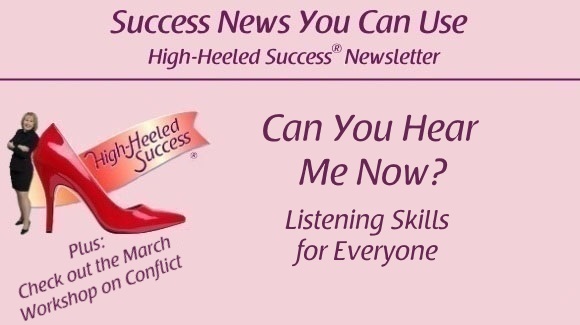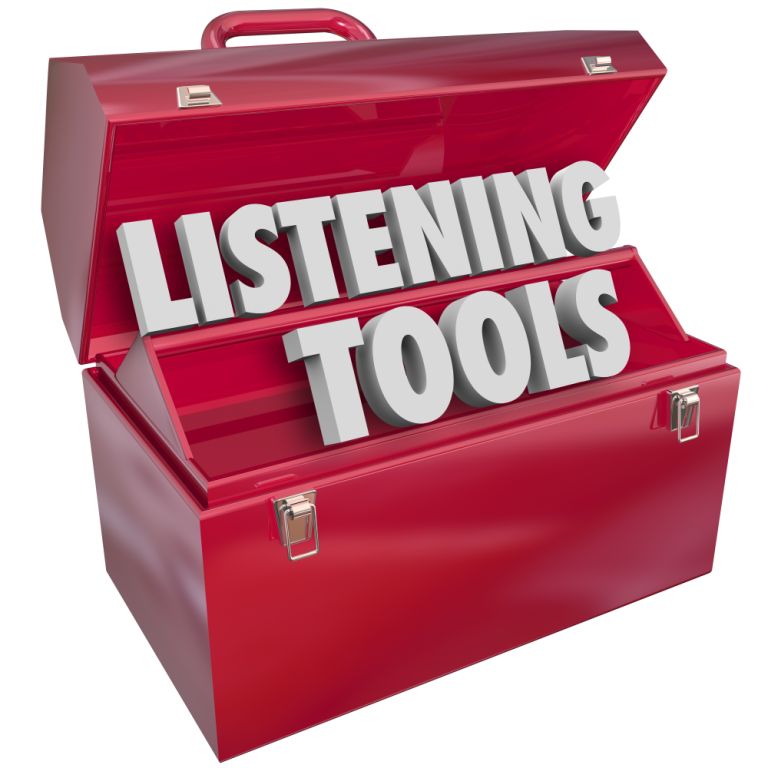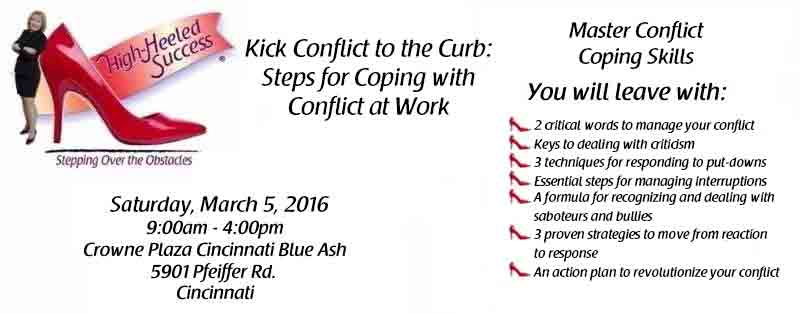|
|
Kay’s Consulting Corner |
|
|
Each month in this section, Kay offers actionable career consulting tips. Listening for Workplace Success This small quiz is from a larger self-assessment that I give in one of my workshops, which explores communicating for workplace success. Envision yourself immersed in conversation, or recall a recent discussion with someone, and score your behavior accordingly as you work through the quiz. Listening Skills Mini Quiz
After each statement, write the number that best reflects your habits:
Now, add the numbers. If you scored 14 or lower, you may already know that you need help honing your listening skills. If you are surprised by your score, or some of the above concepts were new or challenging, you may want to consider further exploring the art of listening. As mentioned both here and in the main article, paying attention, making eye contact, and body language are integral parts of listening. However, an even deeper level of listening entails clearing our mind of preconceived notions and prejudices that can be true barriers to hearing. For example, when someone has a drastically different point of view, it could be challenging to hear them out if you think their intent is to change your mind or opinion. Sometimes physical, cultural and language variances can inhibit receiving ‘the message’, without us even realizing it. In listening to someone whose appearance, clothing or voice is drastically different from either our own, or from what we know as familiar, it can be a potential distraction. Examples include being inappropriately dressed, clothing or gestures from a different culture, or an unfamiliar accent. Any combination of the variables in the quiz or article can test our listening skills. If you think you might need help in this area, give me a call to explore better listening practices. Ready to Take Your Career to the Next Level?
Register now and receive a reward!
Spread the news and reap rewards. Receive cash in hand, or credit toward the High-Heeled Success® workshop ‘Kick Conflict to the Curb: Steps for Coping with Conflict at Work’ on March 5, or a future workshop registration.
*Your referral should put your name in the comments box when they register online, or provide your name if they call the office at 513-561-4288 to register. Cash incentives awarded during workshop.
|
|
Client Case Study – Shelly Whitehead |
|
From Closet Bossy Girl to Boundary-Setting Entrepreneur - How Kay Fittes Got Me on the Right Track True confessions: I was a bossy little girl. In my defense, I had to be to organize events like annual neighborhood carnivals when I was 8, fully produced plays at 10, and other stuff that no little kid should probably ever have taken on. But, with the help of a pack of willing worker-bee friends, I did, and, in the process, we had a lot of fun and made a little cash. But, all that “bossiness” drove my genteel, Southern Belle-ish mother crazy, and all I ever heard her say was “stop being so bossy – you’ll never have any friends! No one will like you.” And later, “Boys, don’t like girls who are bossy, Shelly.” So, being the good little girl I was, I internalized that message. And internalized it and internalized it all the way until Grown-up Shelly became afraid to ever set boundaries or lead anybody anywhere for fear they wouldn’t like me and I’d end up a grumpy, lonely old maid. Funny thing is, that didn’t work either. In fact, it downright backfired on me time and again throughout my career when I’d push down my ideas and needs and go along with the prevailing winds in the hopes that everyone would “like me.” Problem was, it never lasted and finally, I’d have to let it all out – often with disastrous consequences. I tried to find answers via an assortment of gurus, but finally just figured there was just something terribly wrong with me. Then, I asked Kay Fittes for her take on an emerging workplace problem and -- amazingly –- in one quick evaluation, she hit the problematic nail square on the head. With her quick, to-the-point observations of a few of my interactions with an associate, Kay opened my eyes to the fact that even fairly convincing, pretend-pushover/closet-bossy gals like me, can’t keep up the act forever. At some point, you have to stand up for yourself and, as Kay suggested, wouldn’t it be better to set boundaries at the outset instead of continually being pushed around until you explode? Wait. What?! … That actually makes sense. A Sorcerer’s Gift for Seeing your Personal Stumbling Blocks Honestly, I don’t know how she does it, but I truly wish Kay Fittes would clone and bottle herself for distribution to every young woman at the start of their careers. The particular problem I took to her revolved around an increasingly unproductive relationship that was developing with a well-meaning associate. In short, emotions for both of us were elevating, while productivity was plummeting. And, through it all, clueless me had no idea that anything I was or wasn’t doing was provoking the situation. But as ever-diplomatic Kay put it, “Perhaps you need to set some boundaries?” Of course, at first, I balked. “What?!” I thought. “That would be kind of bossy, wouldn’t it?” I said as my mother sat firmly planted on one shoulder. “No,” Kay explained, “it’s establishing your needs to get the job done.” “Oh!” said clueless Shelly. “Not bitchy? Not bossy?” “No,” explained ever-patient Kay again. “Standing up for yourself and your needs to do a good job.” It was eye-opening. It was a breakthrough. It was the kind of guidance we all need and I was lucky enough to get. I’ve left a lot of career damage in the wake of my “friend-pleasing, un-bossy” behavior over the years. But hopefully, I will have the chance to work with a new empowered attitude from here on out that sacrifices neither me, nor my career, nor my true friends. Thank you Kay Fittes, for helping me get started on that path. Shelly A. Whitehead is a producer/reporter of the monthly regional KET TV show, Inside Northern Kentucky. She creates custom marketing content as well as fun and funky personalized footwear. For more info or a link to her website launching February 14, either call or text 513.478.4485 or go online to https://www.linkedin.com/in/writerwhitehead |
|
High-Heeled Success® supports Dress for Success through donations of clothing, time and money. We offer complimentary seats at every workshop for women participating in the Dress for Success program. |
Share This Newsletter With Others: Please take a moment and share this with your friends and colleagues who you think might benefit. Find Us Here:
|
|
Contact Info: Website: https://www.highheeledsuccess.com Email: kay@highheeledsuccess.com ©Copyright 2016. Kay Fittes. All Rights Reserved. |
|
|





